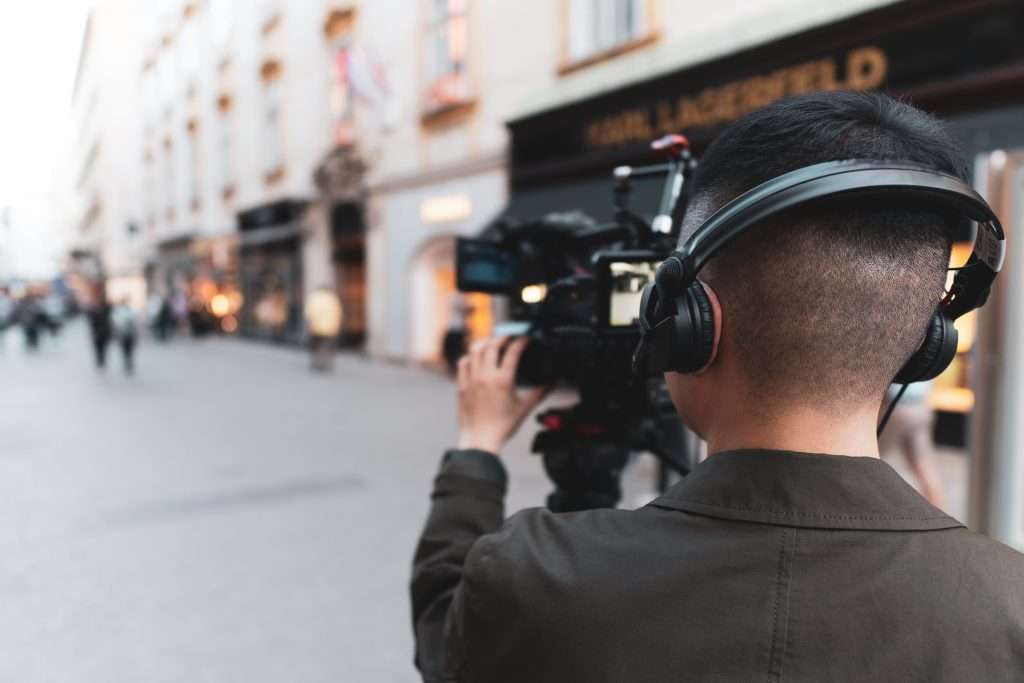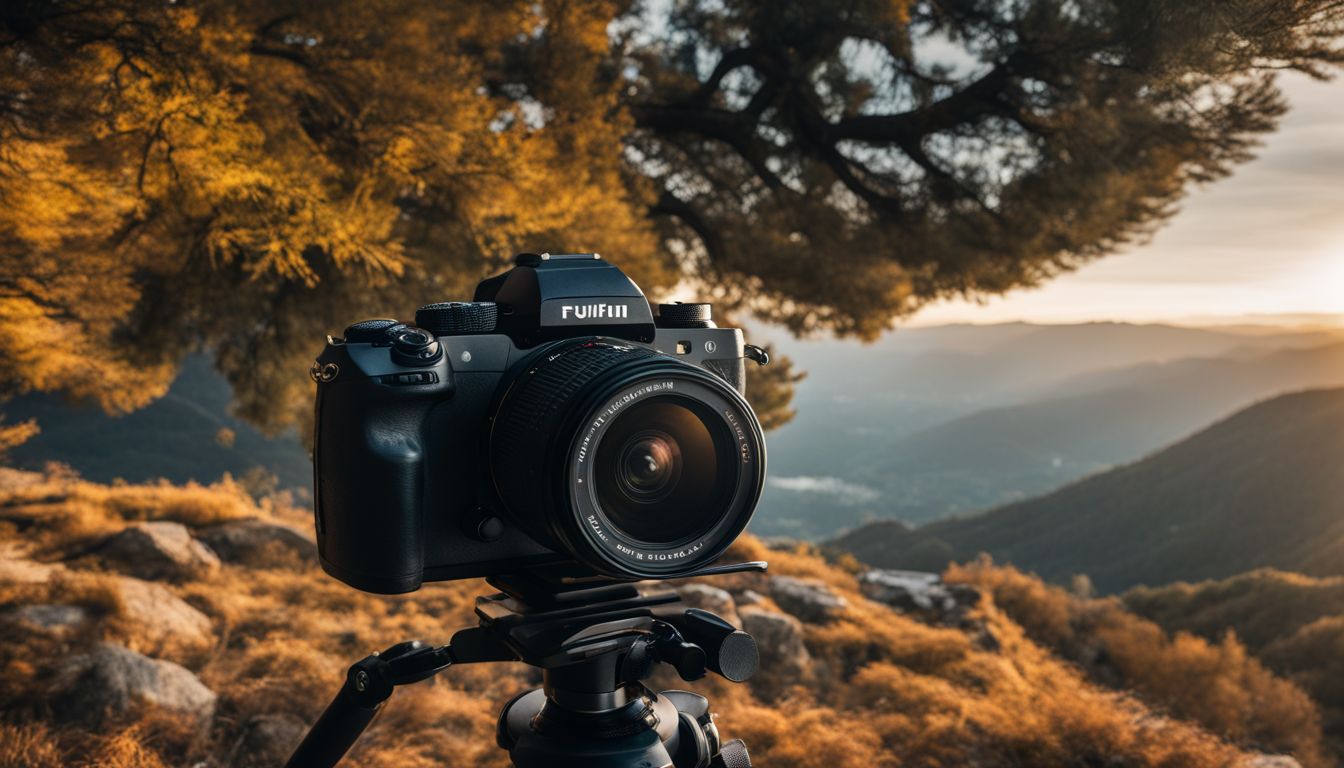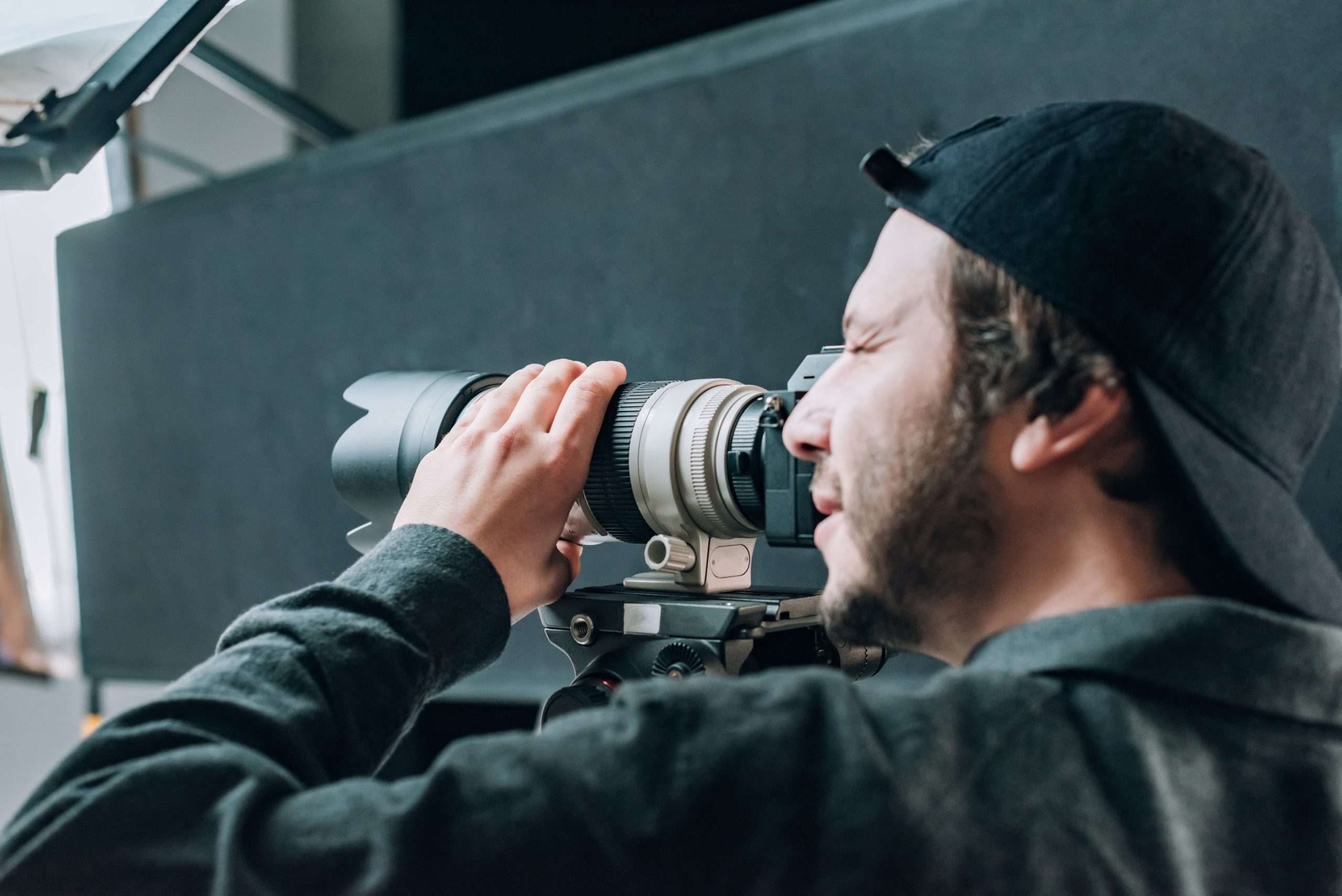Ever scratched your head while trying to pick apart the difference between a cameraman and a videographer? Don’t fret, you’re not the only one! Even we had our brows furrowed in confusion over this very conundrum.
However, after taking an intriguing journey into the worlds of film and video production, we discovered it’s far more than just splitting hairs. In this article, we unravel these disparities – shedding light on their unique roles, pivotal responsibilities, and guiding you through when to call upon which maestro for your creative projects.
Right then! Ready for some enlightening scoop? Off we go!
Key Takeaways
- A cameraman’s main job is to capture footage for TV shows, adverts, or films, while a videographer records events and makes videos out of them.
- Cameramen often work on big productions and take instructions from directors or cinematographers, focusing on technical details. Videographers work independently or in small teams and need good planning skills to capture moments quickly.
- Both cameramen and videographers need knowledge of cameras and tools, but videographers also need editing software skills. Cameramen focus on getting the right shots, while videographers record events as they happen without following a script.
- The decision to hire a cameraman or videographer depends on factors like project purpose, scope, budget, expertise needed, artistic direction required, timeline, and available resources
Definition and Differences between a Cameraman and a Videographer

A cameraman and a videographer have distinct roles and responsibilities in the field of film production. Their duties, work environment, education requirements, and expertise differ significantly.
Primary duties and responsibilities
We need to know what a cameraman and a videographer do. Here are their main jobs:
- The job of a cameraman is to use a camera to get footage. This can be for TV shows, adverts or films.
- A videographer records events and makes video films out of them. They often work on their own or in small teams doing jobs for different clients.
- Cinematographers, also known as directors of photography, play a key role in setting up shots for movies or videos. They decide how the final shot will look.
- A cinematographer works closely with the director. Together they choose lights and camera angles that fit the story best.
- When working on big productions like feature films, cinematographers often make artistic choices.
- While doing their job, cameramen may get instructions from either the director or the cinematographer. Their main focus is to get the shot right by looking at technical details.
Work environment and settings
A cameraman often works in varied settings. They can be found on a busy film set, shooting scenes for a movie. At other times, they work in TV studios capturing talk shows or news broadcasts.
Working as a cameraman needs one to adapt to changing surroundings fast and efficiently.
Videographers have different types of workplaces. They might shoot videos at weddings, conferences, or even music gigs! These jobs need good planning skills and the ability to capture moments quickly.
Videographers also create content for social media posts or company ads which means they sometimes work indoors too.
Education and training requirements
Let’s talk about what a cameraman and a videographer need to know before starting their jobs.
- For both jobs, it helps to have a high school diploma.
- Many cameramen and videographers also choose to go to film school. They learn how cameras work and how to use them.
- In film school, students learn about different types of camera equipment.
- They also get hands – on training, like how to set up shots and edit video.
- But not all learning takes place in schools. Some skills are learned on the job or through internships.
- As part of their training, they might learn from senior teammates.
- Cameramen working for TV shows or movies often start as a production assistant or grips.
- Videographers who want to do wedding videos may begin by taking jobs at smaller events.
- Many cameramen and videographers keep up-to-date on new camera gear and software.
- Sometimes they may take short courses on video editing or visual storytelling for extra training.
Skills and expertise
Cameramen and videographers need good skills. They must know how to use cameras and tools well. Videographers have to blend sounds, pictures, and clips into one piece. For this, they must learn editing software.
Cameramen also need technical knowledge for film shoots or TV shows. Both jobs ask for an eye for detail and a steady hand when filming or shooting pictures. Being creative is key too because it makes their work stand out from others’.
Good people skills are a plus as they often work in teams or with clients.
Understanding Videography and Cinematography

Videography and cinematography may seem similar, but they have distinct differences in approach, style, and purpose. Let’s delve deeper into these artistic and technical aspects to understand the world of visual storytelling.
Differences in approach and style
Cameramen and videographers have different ways of working. A cameraman sticks to the plan. They follow the script given by a director or producer. They aim for sharp, clear shots that match the story’s mood and theme.
On the other hand, a videographer is more flexible with their shots. They capture video in real-time events like weddings or concerts. Their job is to record every moment as it happens without following a pre-set plan or script.
That way they create an authentic feel in their videos.
Artistic and technical aspects
In the world of film, art and tech blend. A cinematographer handles the look of a film or video. They talk with the director to pick styles, lighting, and camera angles. This helps tell the story better.
Their work is more about art. Then there’s a cameraman who sets up their camera to get these shots. They often follow orders from others on set such as directors or cinematographers.
Their work leans more towards tech stuff like how to use cameras right way but they can still be creative in their own ways too!
Purpose and focus of each role
We use our skills in different ways. A cameraman focuses on getting the right shots. They follow directions from others to make sure they capture what is needed for a film or TV show.
Getting the technical details right matters most to them.
A videographer is more about recording events as they happen. They need to be creative and quick, catching every important moment at weddings or concerts.
The cinematographer thinks about the look of a whole film. This role needs an artistic eye, deciding on lighting and camera angles. These choices help tell the story in the best way for viewers to enjoy it.
All roles are key parts of filmmaking but have their own focus and purpose.
Is a Videographer a Cameraman? Exploring the Overlaps and Differences
Let’s explore the overlaps and differences between a videographer and a cameraman. While both roles involve capturing footage using a camera, there are some distinctions to consider.
A cameraman, also known as a camera operator, typically works in broadcast television or film production. They operate cameras to capture footage for various purposes, such as television shows, movies, or commercials.
Their focus is often on the technical aspects of filming and ensuring they capture the desired shots according to instructions from a cinematographer or director.
On the other hand, a videographer is involved in recording events and creating video films. They document occasions like weddings, conferences, or documentaries. Videographers may work independently or as part of a small team and provide video production services for different clients.
While they may share some similarities with cameramen in terms of operating cameras, their main role is centered around documenting real-life moments rather than larger-scale productions.
It’s important to note that these roles can overlap depending on the context and industry. In certain situations like smaller film productions or freelance projects, individuals might take on both cameraman and videographer responsibilities interchangeably based on their expertise and available resources.
Ultimately, understanding the specific needs of your project will help determine whether you require the skills of a cameraman or videographer.
When to Hire a Cameraman or a Videographer
When deciding whether to hire a cameraman or a videographer, it is important to determine the specific needs of your project and consider factors such as event coverage requirements, budget constraints, and availability of resources.
Determining the needs of your project
To determine the needs of your project, consider the following:
- Purpose: Identify the purpose of your video project. Is it for promotional or marketing purposes, documentary-style storytelling, or event coverage?
- Scope: Determine the scale and scope of your project. Will it be a small-scale production, like a short advertisement, or a larger-scale production, such as a feature-length film?
- Budget: Consider your budgetary constraints. This will influence whether you can hire a professional cameraman or videographer or if you need to rely on in-house resources.
- Expertise: Assess the level of expertise required for your project. Do you need someone with technical skills and experience in camera operation and cinematography? Or do you need someone who specializes in event coverage and capturing real-time footage?
- Artistic Direction: Determine whether your project requires a strong artistic direction and visual storytelling approach. If so, you may want to consider working with a cinematographer or director of photography who can bring creative vision to your video.
- Timeline: Evaluate your timeline and deadline for completion. If time is limited, hiring a team of videographers may be more efficient than relying on a single cameraman.
- Resources: Take stock of available resources, including equipment and personnel. This will help determine whether you have the necessary tools to execute the project in-house or if you need to outsource to professionals.
Considerations for event coverage or film production
When deciding whether to hire a cameraman or videographer for event coverage or film production, there are several factors to consider. These include:
- Type of Event: Determine the nature of the event you need coverage for. Is it a live event such as a concert or sporting event? Or is it a scripted production like a film or TV show? This will help you decide whether you need a cameraman who can capture the action in real-time or a videographer who can create a cohesive narrative.
- Expertise: Consider the specific skills and expertise required for your project. If you need someone with technical knowledge and experience operating professional cameras and equipment, a cameraman may be more suitable. On the other hand, if you’re looking for someone with creative storytelling abilities and an artistic vision, a videographer may be the better choice.
- Budget and Resources: Evaluate your budget constraints and available resources. Cameramen may typically charge higher rates due to their specialized skills and experience working on larger-scale productions. Videographers, on the other hand, may offer more affordable options while still providing high-quality video services.
- Artistic Direction vs Technical Direction: Determine whether you need someone who can provide artistic direction or focus more on technical aspects. Cameramen often follow instructions from directors or cinematographers to capture specific shots, whereas videographers may have more creative control over the storytelling process.
- Portfolio and Experience: Review the portfolios and past work of potential candidates to assess their suitability for your project. Look for samples that align with your vision and requirements, whether it’s dynamic live event coverage or cinematic storytelling.
Budget and resources
Considering the budget and resources is an important factor when deciding whether to hire a cameraman or a videographer. Hiring a cameraman for larger-scale productions may require more financial investment as their technical expertise and equipment can be costly.
On the other hand, hiring a videographer for smaller events or projects may be more budget-friendly, especially if you only need straightforward documentation without extensive artistic direction.
It’s essential to determine your project’s needs and consider the available resources before making a decision on which professional to hire.
Conclusion
In conclusion, the main difference between a cameraman and a videographer lies in their primary duties and focus. A cameraman is typically involved in broadcast television or film production, operating cameras to capture footage for shows or movies.
On the other hand, a videographer focuses on recording events such as weddings or conferences, creating video films to document real-life moments. While both roles involve capturing footage using a camera, they differ in terms of artistic direction and purpose.
Do Videographers Need to Have a Certain Personality?
When it comes to videography, the personality traits of videographers play a crucial role. These professionals need to be creative, detail-oriented, and adaptable to capture the essence of an event or tell a compelling story through their lens. The ability to work under pressure and collaborate with clients and team members is also vital in delivering high-quality videos. Ultimately, having the right personality traits enhances a videographer’s ability to capture meaningful moments and create visually stunning content.
FAQs
1. What is a cameraman?
A cameraman is a person who operates the camera to capture video footage.
2. What is a videographer?
A videographer is a person who not only operates the camera but also plans, shoots, and edits videos for various purposes.
3. Is there any difference between a cameraman and a videographer?
Yes, the main difference is that while both operate cameras, videographers have additional skills in planning and editing videos.
4. Can a cameraman do the same things as a videographer?
No, typically, a cameraman’s role focuses solely on capturing footage with little involvement in other aspects like planning and editing.
5. Which one should I hire for my project: a cameraman or a videographer?
It depends on your needs. If you require someone to simply operate the camera, then hiring a cameraman would be sufficient. However, if you need someone who can handle all aspects of video production from shooting to editing, then hiring a videographer would be more appropriate.
What type of footage is the cameraman capturing in Africa?
The cameraman is capturing footage that can range from wildlife and natural landscapes to cultural events, daily life of local communities, and artistic endeavors within the African continent.
How does a cameraman contribute to the art scene in Africa?
A cameraman contributes to the art scene by documenting artistic expressions, recording performances and visual arts, as well as creating films or documentaries that showcase the diverse cultures and creativity found across Africa.
What challenges might a cameraman face while filming in Africa?
Challenges can include dealing with difficult terrain and climate conditions, ensuring the safety of equipment and crew, navigating bureaucratic hurdles for permits, respecting local customs and sensitivities, and sometimes working in politically unstable or conflict-prone areas.
How do ethical considerations impact a cameramans work in Africa?
Ethical considerations require the cameraman to film respectfully without exploiting subjects or perpetuating stereotypes. They must obtain consent from people being filmed, give accurate representations of cultures and situations, and ensure that their presence does not disrupt or harm the environment or communities.
In what ways does footage captured by a cameraman in Africa reach an international audience?
Footage reaches international audiences through various platforms such as television broadcasts (documentaries, news reports), online media outlets (streaming services, social media), film festivals showcasing African cinema or themes, and exhibitions at art galleries that may feature video installations.






